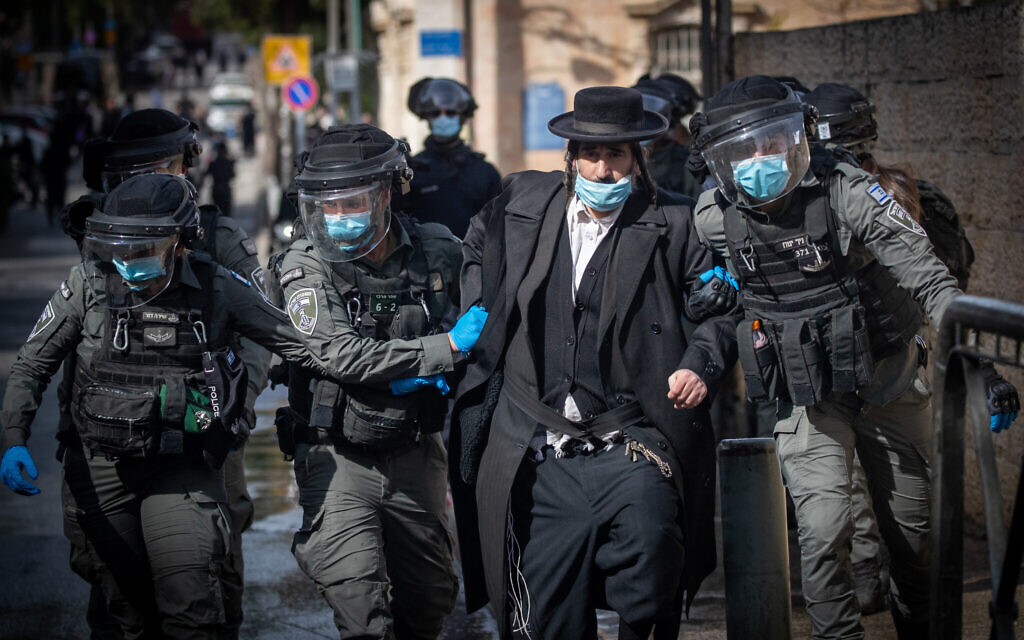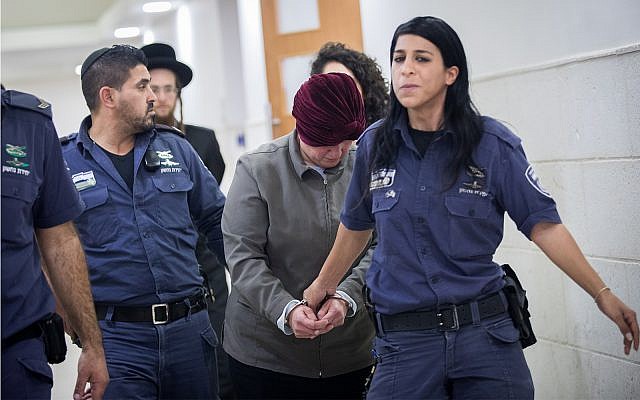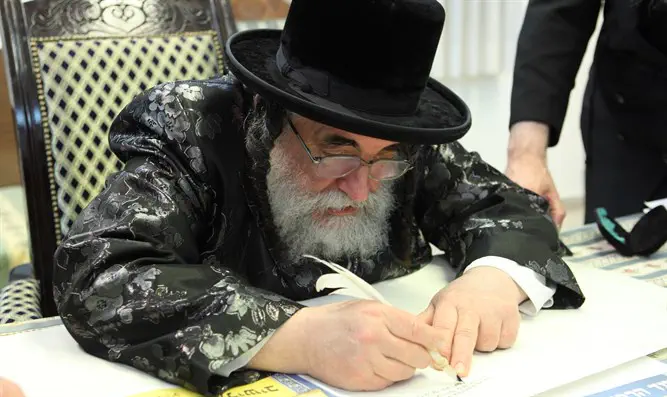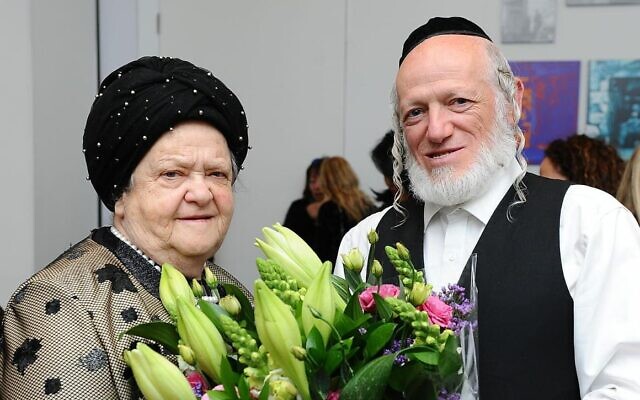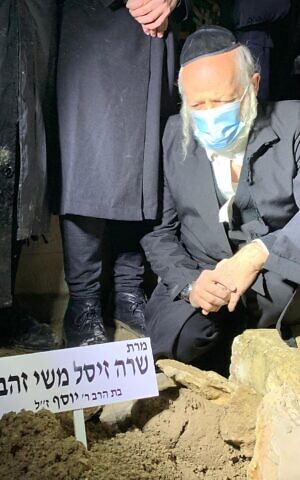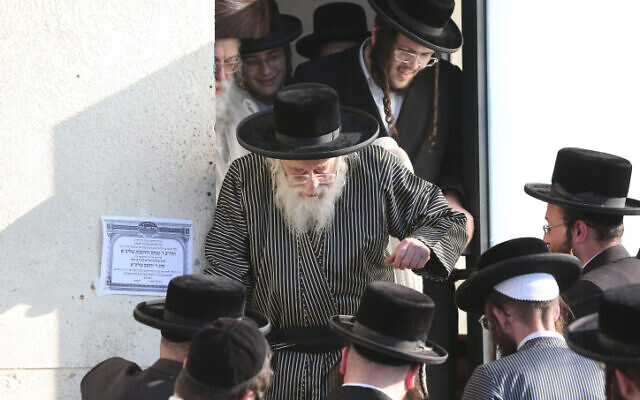Monday afternoon in the Knesset. MK Moshe Gafni of United Torah
Judaism heads to the dais to speak about a bill advancing through
parliament that will allow police to slap steep fines on schools that
violate virus restrictions and even to close them by force.
He’s visibly angry; his comments are short and to the point.
“You’re only bringing this bill to vilify the Haredi public!” he declares.
Then he adds, in comments that would later go viral on Israeli social
media, “It’s not our fault! You, who sent us to live in such crowded
conditions, it’s your fault!”
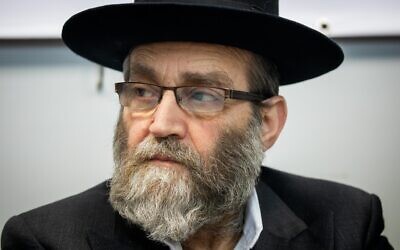
Chairman of the Degel haTorah party Moshe
Gafni, at the opening event of their election campaign, ahead of the
Israeli elections, in Jerusalem, on February 12, 2020. (Yonatan
Sindel/Flash90)
It was an astonishing display that encapsulated the confused, anxious
Haredi non-response to the crisis of rule-breaking that’s setting parts
of the community aflame, and the frantic search for someone to blame.
Ultra-Orthodox violations of the virus restrictions aren’t new.
The problem has simmered for months, occasionally waning as contagion
rates and corresponding restrictions recede, then exploding again onto
the public agenda when the pandemic returns with a fury.
But the latest round of anger and anxiety surrounding Haredi
struggles with the virus has quickly reached a fever pitch. Recent days
have seen violent riots in Haredi population centers as police moved in
to enforce long-ignored health closures.
In the usually placid city of Bnei Brak, a municipal bus was torched to its metal skeleton
after young Haredi men dragged the driver from the vehicle. Camera
crews, including a Fox News team, were either attacked or had their
vehicles vandalized in Haredi areas. Israeli news broadcasts have
carried photogenic vignettes of such violence for days.
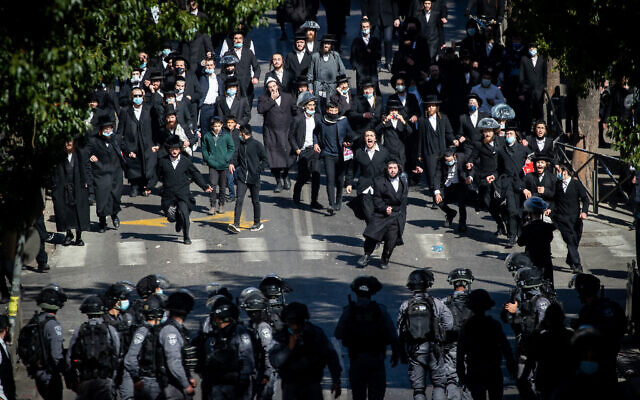
Police clash with Haredi men as they
enforce coronavirus restrictions in the Haredi neighborhood of Mea
She’arim in Jerusalem, January 24, 2021. (Yonatan Sindel/Flash90)
And throughout the rising violence, Haredi rabbinic and political leadership were nowhere to be found.
Voter fury
The anger and frustration have now engulfed the debate. Channel 12,
sensing the public mood, decided to ask in a poll released Tuesday
whether Israelis wanted Haredi political parties to be part of the next
governing coalition.
Among the self-identified center-left, 78 percent prefer the next
government not include the Haredi parties; just 5% want them included.
That’s an extraordinary gap, but not really unexpected. The center-left
is largely drawn from Israel’s secular bastions, the large cities,
kibbutzim, and the like.
The surprising figure came from the other side, from the
self-identified right. A majority, 52%, said they, too, didn’t want the
Haredi parties in the next government. Just a third, 33%, said they
wanted them.
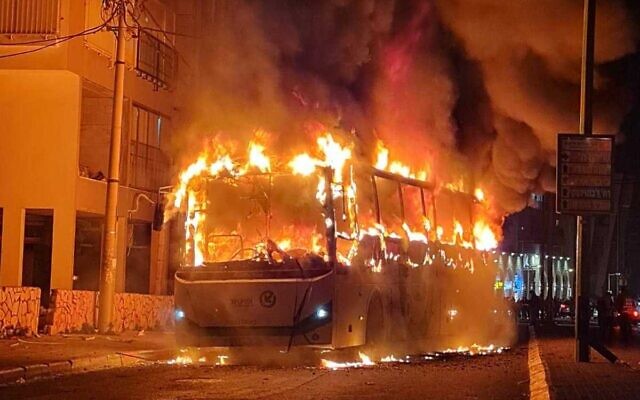
A bus set alight by a mob in the city of Bnei Brak, January 24, 2021. (Israel Police)
As Channel 12 explained, that’s “an extraordinary shift,” underlining
the current of anger at the ultra-Orthodox for refusing to adhere to
virus restrictions and the latest iteration of longstanding bitterness
toward a society and a leadership that is seen by many Israelis as
having carved out an autonomous existence separate from the broader
Israeli society.
Anyone following the social media responses to Gafni’s comments,
which ranged from sarcastic to vicious, saw that animus borne out.
“Sure, of course. I sent the Haredim to live in crowded apartments.
Not their birthrate,” one commenter sneered, earning hundreds of likes.
“Really sorry. Sorry we went to school, served in the army, worked,
paid taxes, and never understood that leeches like you…” – there’s no
need to translate the entire comment. The gist is clear. The sentiment
was commonplace on Hebrew-language social media in the wake of the
speech.
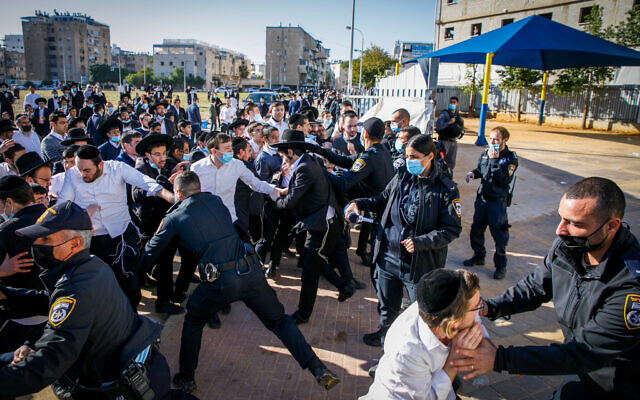
Haredi men clash with police to protest
the closure of a yeshiva that was operating in violation of lockdown
rules, in the southern Israeli city of Ashdod, January 24, 2021.
(Flash90)
Teeming and desperate
Gafni’s Knesset speech came during a debate on a bill that sought to
double fines for schools that defy lockdown closures. The refusal to
shutter their schools has been viewed as an expression of the
foundational role Jewish education has in Haredi life, so why mention
crowding?
No one “sent” the Haredim to live where they do, as Gafni claimed. No
law requires that double-digit percentages of Haredi men refuse to join
the workforce and commit themselves instead to full-time religious
study. No one demands that Haredi couples have 12 children, even as they
plan to have only one parent working.
But Gafni’s concern about crowded conditions is nonetheless a real
and all-pervasive Haredi experience. Haredim have among the highest
birthrates in Israel. In some Haredi towns, families with 10 or 12
children are the norm. Apartments, however, are no bigger than in other
towns and cities.
Those crowded conditions are central enough to Haredi life that they
shape the most basic social institutions of many ultra-Orthodox.
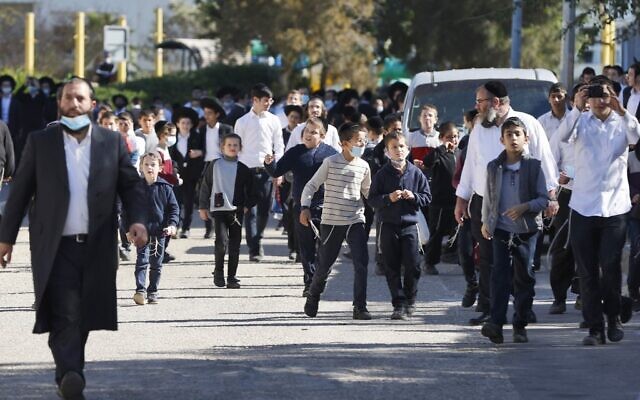
Haredi schoolchildren outside a school
that opened in violation of COVID-19 lockdown rules following its
closure by security forces, in the city of Ashdod on January 22, 2021.
(Jack Guez/AFP)
Haredi society is in an important sense built on the principle that a
great deal of childcare is outsourced to the community. Nowhere, or at
least nowhere in Israel, is the old adage that it takes a village to
raise a child more true than in the Haredi community. Children spend
most of their waking hours in communal and educational frameworks
outside the home, many of them only returning home at 6 p.m. or even
later.
A Haredi news site reported in frustration that the bus
set alight by rioters burned for an hour, melting the window shades of a
nearby apartment building, while no cop or firefighter bothered to show
up
A 12-child family sees its small 75-square-meter (807-square-foot)
apartment not as a living space meant to be used during the day, but as
little more than a glorified bedroom for people who must spend their
waking hours somewhere else.
Lockdowns thus affect Haredim more powerfully. It’s hard to compare
the struggles of the average five-person secular family through the
crisis with those of a 12-person family, especially one that also shuns
smartphones, television and the internet. Home isolation under such
conditions is well-nigh unbearable. The repeated lockdowns, and
especially the school closures, have hit Haredi society especially hard.
In many places, parents and school officials conspire to open their
schools, furtively and with the full knowledge of the dangers involved,
out of simple, raw desperation.
It is in such places that news film crews have taken footage of
elementary schools where students were told to rush out the back gate if
police arrive.
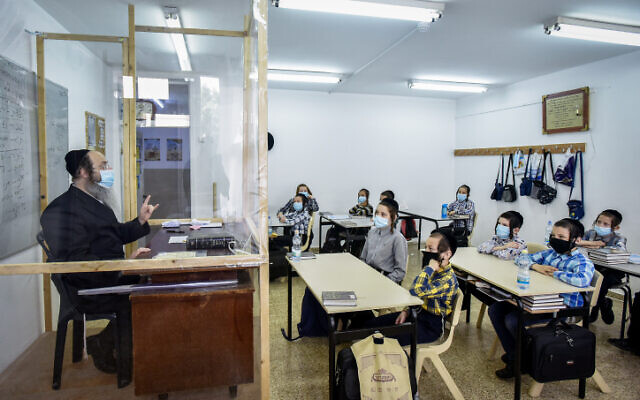
Ultra-Orthodox Jewish kids from the
Kretchnif Hasidic dynasty wearing face masks as they listen to their
teacher at a school in the city of Rehovot, on September 10, 2020.
(Yossi Zeliger/Flash90)
It is that rule-breaking that drove lawmakers to consider the bill
that so angered Gafni, which would increase fines to as much as NIS
10,000 ($3,000) for an institution that defies the lockdown, and would
grant police the power to close the institution by force.
And it was in the middle of a debate on that bill that Gafni went
before the cameras and shouted at non-Haredi Israel that it was their
fault – “you who sent us to live in such crowded conditions” – that
Haredim struggle to obey the virus rules.
A community forsaken
The ultra-Orthodox know they are suffering from the virus far more
than non-Haredi Israelis. Their elderly are dying at three times the
rate of secular Israelis.
Prominent Haredi journalists and public
figures have railed against the rule-breaking among many in their
community.
In one video spread far and wide on Haredi social media, eventually
making its way to the mainstream nightly news broadcasts, a Haredi man
is heard attempting to report a school that had opened in violation of
the lockdown rules, but is told by police that enforcement in Haredi
areas is subject to “political” limitations.
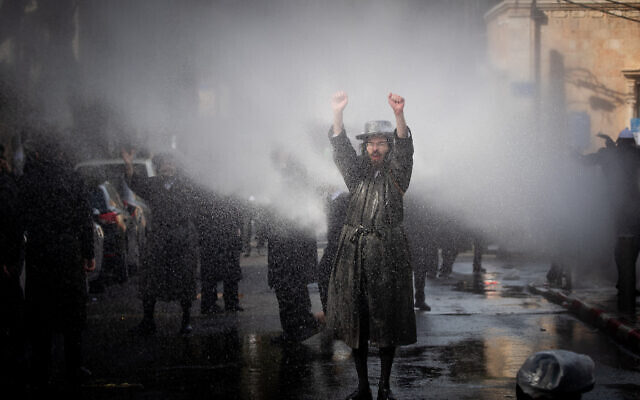
Police clash with Haredi Jewish men as
they enforce coronavirus restrictions, in Jerusalem, January 26, 2021.
(Yonatan Sindel/Flash90)
A Haredi news site reported in frustration that the bus set alight by rioters on Monday burned for an hour,
melting the window shades of a nearby apartment building, while no cop
or firefighter bothered to show up. Such incidents, and countless others
like it, served to underline the frustrations of those who feel
authorities have unfairly consigned the community to its fate.
They have contributed, too, to the feeling among many Haredim that
their community has been turned into a convenient scapegoat for the
broader society’s frustrations with the pandemic, even as it was
abandoned by the state and by authorities who refuse to take their needs
into account.
The anger at the Haredim is real and growing. The anger felt by the Haredim at the government and their own political leaders is just as real, and growing just as quickly.
In a January 6 interview with Israel Radio, Deputy Transportation
Minister Uri Maklev, a lawmaker from Gafni’s UTJ party, warned of
“bitterness toward Netanyahu” among his voters — and toward him and his
fellow Haredi lawmakers.

Deputy Transportation Minister Uri Maklev
holds a face mask during a press conference at the Transportation
Ministry in Jerusalem on July 8, 2020. (Olivier Fitoussi/ Flash90)
“There wasn’t consideration given to the needs of the Haredi public” –
forcing large families to isolate in small apartments, for example –
“and there’s a sense of detachment from the Haredi public’s demands,” he
accused.
Haredim “were humiliated and vilified, and the voter is saying [to
us], ‘You should have stood up for us a lot more powerfully.’ I’m not
blameless here, I think it’s important to take the criticism,” Maklev
said.
That criticism isn’t hard to find. Polls over the past month have
shown a slow but steady decline in support for the Haredi parties, Shas
and UTJ, among Haredi voters, which drew a consistent 16 seats between
them a month ago but are more likely to get 12 and 13 over the past
week.
Haredi anger has grown potent enough to threaten the Haredi alliance with Likud.
On Monday, as the Likud-backed law fining rule-breaking schools
advanced, UTJ’s Gafni was overheard in the Knesset telling one Netanyahu
adviser, “What are we, your slaves? We’re having serious second
thoughts about this partnership” — the one between the Haredi parties
and Netanyahu.

United Torah Judaism lawmakers, including
MK Moshe Gafni, second left, visit Safed Mayor Shuki Ohana for an
election campaign event of the Degel Hatorah faction, in the northern
Israeli city of Safed, February 26, 2020. (David Cohen/Flash90)
Even the Haredi world’s rabbis haven’t emerged untarnished from the past 10 months.
The Vizhnitzer Rebbe, Rabbi Israel Hager, one of the most influential
Hasidic leaders in the country, is prominent enough and his Hasidic
sect large enough to have a reserved slot on the United Torah Judaism
party’s Knesset slate. Since 2019, that slot has been filled by Hager’s
appointee MK Yaakov Tesler.
Last week, to the astonishment of the country, Hager issued an order
to his Vizhnitz movement’s schools to reopen their gates despite the
government-ordered lockdown.
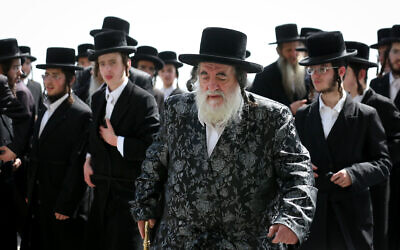
Yisroel Hager (aka the chazer of Bnei Brak) of the Vizhnitz Hasidic dynasty at Mount Meron in northern Israel
It took scarcely a day for the rabbi’s advisers to issue a
“clarification” explaining that the rabbi did not actually mean schools
should open, but was merely expressing the pain he felt over the
cessation of learning.
It was a strange episode. The news reports of Hager’s order angered
countless Israelis. The clarification didn’t seem to explain the
explicit instructions of the original order.
Hager isn’t alone. A similar episode several months ago saw Rabbi
Chaim Kanievsky, widely acknowledged as the preeminent living Ashkenazi
Haredi sage, issue similar instructions against shuttering learning
institutions despite the lockdown in force at the time — only to have
the purported orders reversed by his advisers after a public outcry.
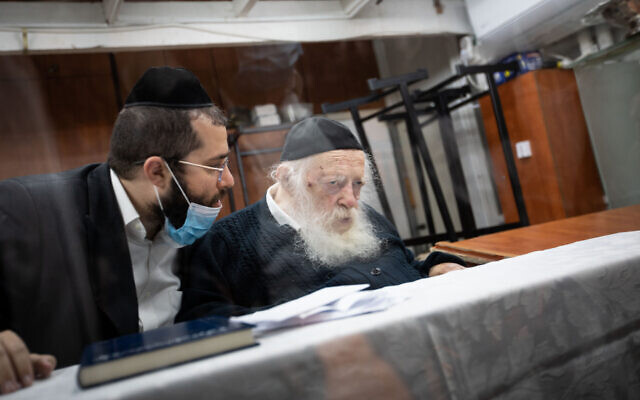
Rabbi Chaim Kanievsky and his grandson at
Yaakov Kanievsky (L) at the former’s home in the ultra-Orthodox city of
Bnei Brak on September 22, 2020
The Haredi community, long accustomed to the leadership of rabbis
believed to be divinely inspired, suddenly finds itself rudderless in
the throes of its most desperate crisis in generations.
Indeed, more and more Haredim are beginning to wonder if the rabbis
aren’t part of the problem. As one Haredi media personality put it
bitterly on Twitter, after calling for “freezing budgets for
institutions” that break the rules, “nothing will change as long as
respect for the rabbis and the Hasidic masters remains intact.”
The street will not forget
The Haredi parties have been key anchors of Prime Minister Benjamin
Netanyahu’s coalitions since 2015. It’s no longer clear that many of
Netanyahu’s non-Haredi supporters want that to remain the case. It’s no
longer even clear that many traditionally pro-Netanyahu Haredi voters
want that to remain the case.
Likud doesn’t want to increase police enforcement in the Haredi
community now, 55 days out from an election in which Netanyahu has no
hope of retaining power without the full-throated support of the Haredi
public.
Yet the bill to increase fines against violators, set to advance in a
Wednesday plenum vote, isn’t being pushed by the secularists or the
left, but by Likud. Netanyahu has caught wind of the public mood. He
can’t afford to lose voters angry at his lax enforcement of Haredi
rule-breaking either.
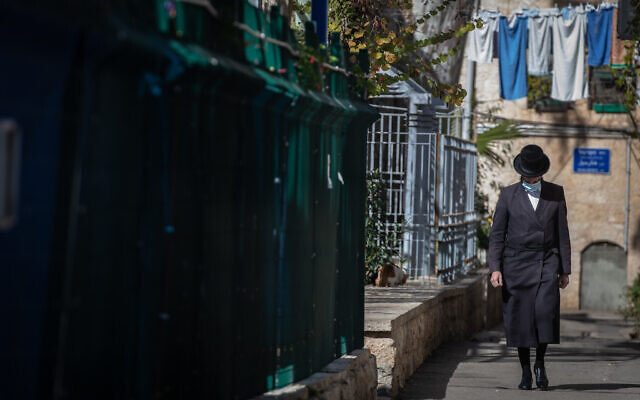
A Haredi man in Jerusalem wears a face
mask as he walks in the city center on January 26, 2020, as Israel
enters a third lockdown due to the COVID-19 pandemic. (Olivier
Fitoussi/Flash90)
The recent violations, the violence in the streets, the sense that
Haredi communities are betraying the basic solidarity expected of them
by the rest of Israeli society – all these images and emotions have
crystallized into widespread anti-Haredi anger, an anger Netanyahu must
now grapple with as it seeps deep into the political right.
The pandemic may soon come to an end as the vaccination drive catches
up to the contagion. But the social crisis the pandemic has sparked
among the Haredim, the discovery that neither their religious leadership
nor their political parties really know how to lead them through a
crisis, that neither the Israel Police nor the government they have
backed time and again is willing to battle their anarchic segments and
bring order to their streets — that painful realization will remain long
after the virus fades away.
https://www.timesofisrael.com/enfeebled-and-enraged-haredi-society-feels-forsaken-on-all-sides/?utm_source=The+Daily+Edition&utm_campaign=daily-edition-2021-01-27&utm_medium=email








